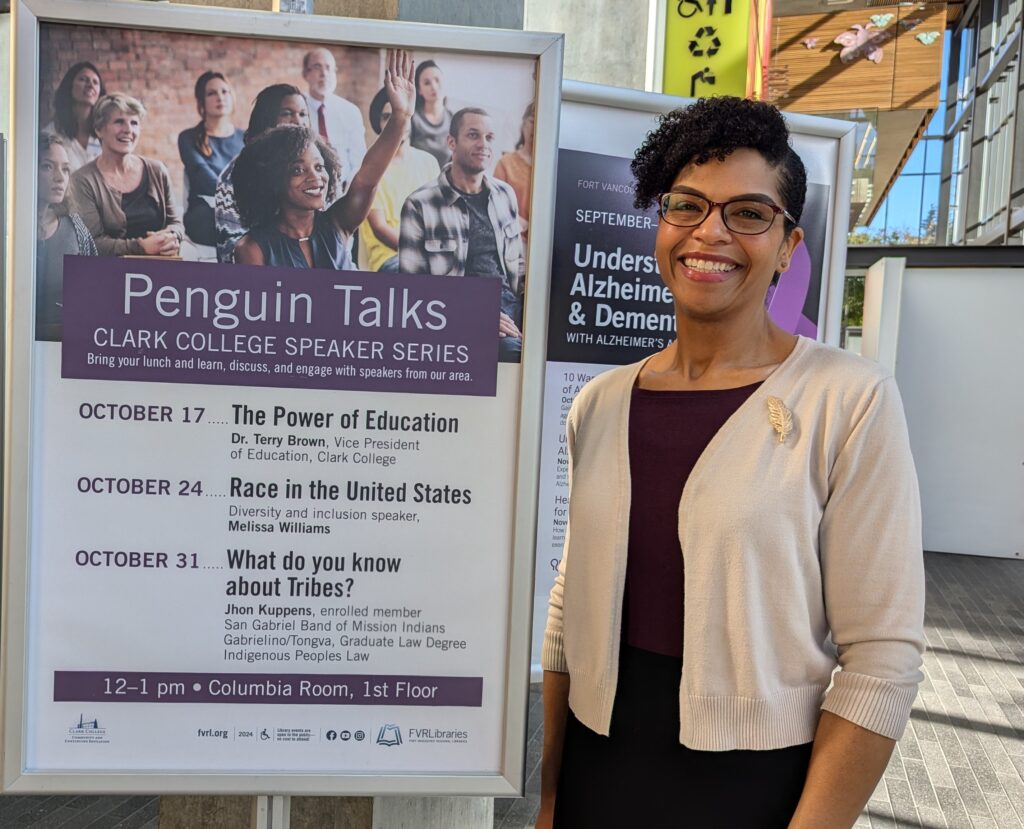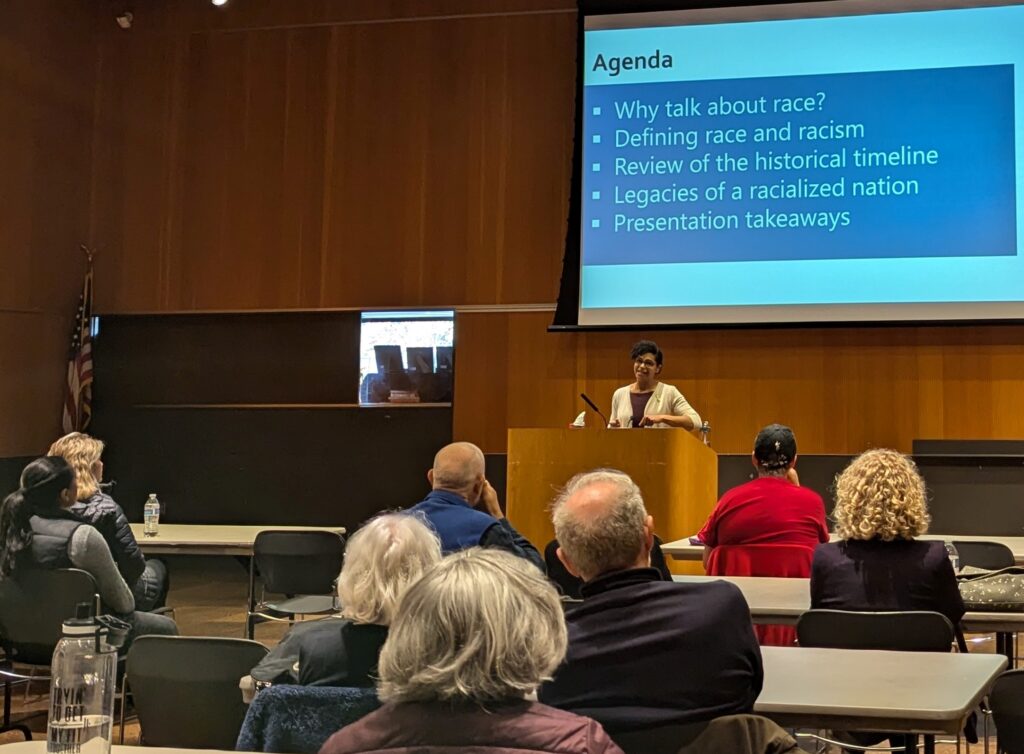Melissa Williams discusses racism at Penguin Talks

Melissa Williams, Policy Associate for Equity, Diversity, and Inclusion at the Washington State Board for Community and Technical Colleges delivered the second Penguin Talks on October 24 at Vancouver Community Library.
Williams has almost 20 years of experience working in administrative leadership positions in higher education, including 13 years at Clark College. She serves on the Alumni Board of Clark College Foundation.
Speaking on the theme “Red, White, and Brown: Race in the United States,” Williams shared a detailed timeline focused on race and policy. She shared slide after slide illuminating laws, Supreme Court decisions, and policies that were integral in the formation of race in the U.S.
All of these policies and laws resulted in far-reaching consequences for those being oppressed. They determined whether a person was free, whether they could vote, where they could attend public school, who they could marry, what language they could speak, whether they were eligible for the G.I. Bill, whether they could get a home loan, live in a certain neighborhood, be protected by a union. The list is long and so very thorough.
One such policy was the Naturalization Act of 1790 which restricted citizenship to “any alien, being a free white person” who had resided in the U.S. for at least two years. Native Americans were considered “domestic foreigners” and were denied universal citizenship.
Other examples were Slave Codes and Black Codes, sets of laws that curtailed agency, expression, and limited recourse for Africans and African Americans—both enslaved and free—for more than 200 years from the 1600s to the 1800s.
Although Blacks were often the target, Native Americans, Chinese, Japanese—and many more people of color were targeted. In 1878, the Supreme Court ruled that Chinese individuals were ineligible for naturalized citizenship. Then the 1882 Chinese Exclusion Act prohibited Chinese immigration for 10 years by an act of Congress. Ten years later, when the law was scheduled to expire, it was renewed and later made permanent. It was not repealed until 1943.
Native Americans were universally granted citizenship in 1924—and they were here first!
In 1942, shortly after the U.S. entered World War II, President Franklin Roosevelt signed Executive Order 9066, forcing the evacuation and internment of 120,000 people of Japanese ancestry living on the West Coast, most of whom were U.S. citizens or documented immigrants.
Williams said, “It is important to think about how policy, law, and traditions have shaped our country and our communities.”

Here are some highlights of Williams’ presentation.
Why talk about race?
- Even with all things equal, people of color nearly always experience worse outcomes than their White counterparts in every sociocultural and economic pillar.
- As a group, Black people specifically almost always experience worse outcomes than all others due to centuries of persistent anti-Black bias around the world.
- The fierce fight for equality and rights that people of color have waged in our nation has broadened access and inclusion for all people. The fight continues.
- Race has a profound impact on our lives.
What is racism?
- Racism is a system of race-based power and advantage.
- Systemic racism is the complex interaction of history, culture, policy, and social institutions that oppresses some groups to give an advantage to others.
- In the United States, the foundation of this system is white supremacy (the superiority of whiteness).
White supremacy
- The notion that White people and their ideas, views, values, communication styles, work styles, pursuits, approaches to relationship-building, appearances, and behaviors are the human standard to which all other people are compared.
- The term “white supremacy” is often associated with racist hate groups, but it more accurately describes the underpinning of U.S. culture and commonplace beliefs of people who grow up in a society.
- White supremacy can exist without malice.
What is race?
- Race as we think of it isn’t biological but is very real culturally, socially, politically, and economically.
- Race is an immensely powerful social construction.
At the conclusion of presenting the timeline, Williams shared a quote from Ibram X. Kendi from his book, How to Be an Antiracist:
“Americans have long been trained to see the deficiencies of people rather than policy. It’s a pretty easy mistake to make: People are in our faces. Policies are distant. We are particularly poor at seeing the policies lurking behind the struggles of people.”
Williams said, “Remember that folks have always been fighting for equity and justice.” She added, “It is important that we continue to grapple with our racialized history. We’re still grappling. We’re still making corrections.”
Some books and films Williams referenced:
- Ibram X. Kendi, Stamped from the Beginning: The Definitive History of Racist Ideas in America (2016)
- Ibram X. Kendi, How to Be an Antiracist (2019)
- Isabel Wilkerson, Caste: The Origin of our Discontents (2020)
- Documentary 13th: From Slave to Criminal with One Amendment, a film by Ava DuVernay that explores the history of racial inequality in the United States and the mass incarceration of Black Americans (2016); streaming on Netflix
- The PBS documentary series: Race: The Power of an Illusion discusses the origins, beliefs, and consequences of what we call race (2003)
About Penguin Talks
Clark College and Fort Vancouver Regional Libraries are partnering to present Penguin Talks, a lunchtime speaker series offered at noon on three consecutive Thursdays on October 17, 24, and 31 in the Columbia Room at Vancouver Community Library, 901 C Street, Vancouver. The free, public series features local experts sharing their knowledge about critical topics impacting our community.
Next Penguin Talk – October 31
Native American, Indigenous or Indian? with Jhon Kuppens
Jhon Kuppens, enrolled member of the San Gabriel Band of Mission Indians Gabrielino/Tongva, will speak about American Indian tribal histories, sovereignty, federal trust responsibility, and rights. Kuppens will explore the impact of tribal politics, culture, law, jurisdiction, and values while examining the legacy of historical trauma.
Kuppens holds a Master of Legal Studies degree in Indigenous Peoples Law from the University of Oklahoma College of Law and a Bachelor of Arts degree in Social Science from Washington State University.
Photos: Clark College/Susan Parrish













1 comment for “Grappling with Our Racialized History”